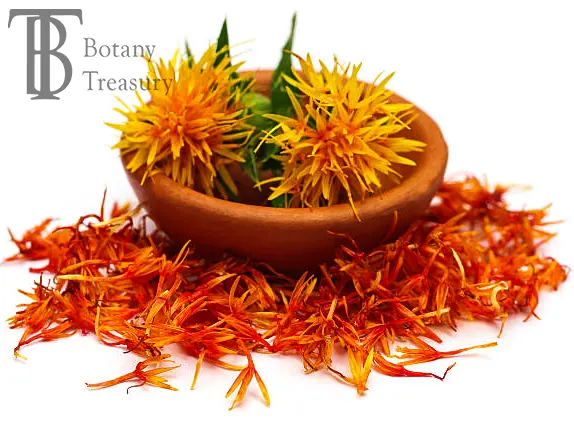
Safflower
- Safflower, scientifically known as Carthamus tinctorius, is a flowering plant native to the Mediterranean region and Asia. It belongs to the Asteraceae family, and is known for its vibrant yellow flowers and edible seeds. Safflower has been used for centuries in traditional medicine and as a food source due to its rich nutritional profile and various health benefits. It is used as a natural food coloring and flavoring agent in various products, including baked goods, beverages, and confectionery items.
Active Ingredients:
- Safflower Yellow (Carthamine): This is the principle active component of safflower, which is responsible for its antioxidant and anti-inflammatory properties.
- Carthamidin: This is another bioactive compound found in safflower flowers, which has been shown to have antioxidant and anti-inflammatory effects.
- Unsaturated Fatty Acids: Safflower oil, obtained from the seeds of the plant, is rich in unsaturated fatty acids, including omega-6 and omega-9 fatty acids.
- Antioxidant Vitamins: Safflower oil also contains antioxidant vitamins such as vitamin E and vitamin K, which help protect the skin and hair from damage.
- Phenolic Compounds: Safflower flowers contain phenolic compounds, which have been shown to have antioxidant and anti-inflammatory properties.
Health Benefits:
- Antioxidant and Anti-Inflammatory Properties: Safflower contains antioxidants and anti-inflammatory compounds that help protect against oxidative stress and inflammation, which can contribute to various diseases.
- Hair Growth and Skin Health: Safflower extract has been found to increase hair follicle length and promote hair growth, as well as exhibit antimicrobial and antifungal properties beneficial for skin health.
- Antibacterial and Antiviral Effects: The plant has been used to treat infections and wounds due to its antibacterial and antiviral properties.
- Antioxidant and Neuroprotective Effects: Safflower petal extract has been shown to have neuroprotective and antioxidant activities, which can help alleviate symptoms of depression and anxiety.
- Cardiovascular Health: Safflower oil, rich in oleic and linoleic acids, has been investigated for its potential in reducing cholesterol levels, improving blood lipid profiles, and preventing cardiovascular disease.
- Bone Health: Safflower seed extract has been found to promote bone growth and density, potentially reducing the risk of osteoporosis and bone-related disorders.
- Weight Management: Safflower oil has been shown to inhibit the formation of adipose tissue. It has been used in clinical trials to help manage obesity by reducing body mass index (BMI) and improving anthropometric parameters.
- Diabetes Management: Safflower seed extract has been found to inhibit alpha-glucosidase, an enzyme involved in glucose metabolism, which may help manage blood sugar levels in diabetes.
- Lung Function and Respiratory Health: Safflower extract has been shown to improve lung function and reduce inflammation in the lungs, potentially benefiting individuals with respiratory disorders.
- Traditional Medicine: Safflower has been used in traditional medicine for various conditions, including mental health issues, skin disorders, and respiratory problems, due to its antioxidant, anti-inflammatory, and antimicrobial properties.
Overall, safflower is a versatile plant with a range of active ingredients that have been shown to have various health benefits and uses in the food and beverage industry.
Botany Treasury is a leading provider of high-quality safflower. If you are interested in purchasing our safflower, please don’t hesitate to get in touch with us.
